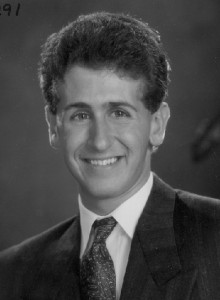Dancing in the Rain: Remembering Michael Burak
By GuestBy Harriet Burak
On my desk at home is a framed print that reads, “Life isn’t about waiting for the storm to pass … it‘s about learning how to dance in the rain.” That pretty much sums up my philosophy of life. That and “When life gives you lemons, throw them back and demand chocolate.” Those who know me, recognize what a chocolate lover I am. Today, with COVID-19 and all the negativity that seems to surround us, I believe it is more important than ever to try to put a positive spin on things.
As many longtime Citizen readers know, my son, Michael, died on September 9, 2004 of a heroin overdose after having battled the disease of addiction for many years. He was 31. At that time, addiction was considered a “moral failing” and it was spoken of in whispers. Truthfully, I knew very little about it then. Fast forward to 2020 and I am so much more educated. I have learned through reading books, talking with others who have experienced the loss of a child, joining coalitions and attending seminars. I am learning every day. Recently I watched a film on YouTube called Choices Matter about three families inadvertently impacted by opioid addiction that began with a prescription to manage pain after surgery. I learn something new almost every day.
When Michael died, I “beat myself up.” I blamed myself for not being able to save my child. The wound I had has not healed and perhaps never will; however, I now see things that perhaps I didn’t before. I recently came across a poem by an anonymous author. It reads, “Why? That’s what we ask. The truth is, we may never be able to know for sure why. But we do know that there is no single ‘should have done’ or ‘did’ or ‘didn’t do’ that would have changed that why. All that love could do was done.” Then I open a bureau drawer and find a card that my son had given me. It reads, “A good mother is like a quilt. She keeps her children warm; but doesn’t smother them.” And in a postscript in Michael’s own handwriting is written, “Thank you for being there when needed and giving me space to find things out for myself. Love, Michael.” Wow! What a love gift from my son to me. And it has been 16 years since he died.
I just finished reading If You Love Me: A Mother’s Journey Through Her Daughter’s Opioid Addiction. As I read the book, I felt that the author, Maureen Cavanagh, was speaking directly to me. At one point, Cavanagh’s daughter asks, “Why don’t you give up!” and Maureen answers, “That’s the one thing I will never do.” My own son, Michael, had said to me when he was struggling, “Thank you for never giving up on me.” I replied, “Michael, as long as you live, I will never give up on you.” Cavanagh goes on to say, “As much as you love your child, you are not more powerful than the disease.” It is so important to recognize that and yet, remember that people recover every day and we can’t lose sight of that. The disease does not have to be a death sentence. There is hope.
In time, we hope with an understanding of substance use disorder as a disease, that it will eliminate or at least reduce the shame and stigma associated with it, allowing more people to get help. In Cavanagh’s book, her daughter, Katie, says, “Drugs and alcohol are not my problem. I’m my problem and only I can fix it.” I wish I had understood this better when Michael was fighting substance use disorder (which is the way the disease is referred to now).
Al-anon advises, “You didn’t cause it, you can’t control it and you can’t cure it.” So what can you do when you have someone in your life who has substance use disorder? Learn more. Gain contacts. Know what to do and who to ask for help. So much more is available now than was back in 2004. There is a difference between helping and enabling. When my son was in recovery, after having spent six months in a rehab facility, I welcomed him back into my home. Big mistake; but I didn’t know that then. I only thought about having him home with me and knowing where he was and that he was safe when we went to bed at night. I have learned that every person in recovery should live in a structured, safe and supported environment for the first year of recovery going through every experience a person encounters over that period of time while surrounded by supportive peers.
Until about age 25, when the brain is fully developed, genetics plays a role in terms of whether a person becomes addicted. Substance use disorder occurs when the brain chemistry allows the disease to manifest initially. For those born with this lurking, insidious disease, the only known cure is no first time. We need to talk about this with our children before they make that choice because it is incredibly difficult to stop using once started.
Beyond that, what can we do? Don’t wait for the storm to pass. Dance in the rain. Throw those lemons back and demand chocolate. Take ownership of your life because it is your life. And most of all, never let a day go by without telling your child “I love you.” I know that if I were lucky enough to have my Michael back with me for one more day, that is what I would tell him. For Love Never Dies.
Short URL: https://www.thecantoncitizen.com/?p=69651











